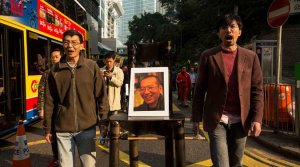Evan Osnos writes of the imprisoned dissident Liu Xiaobo, whose picture is being carried by Chinese protesters. Credit Tyrone Siu/Reuters
Evan Osnos appears to be almost as entrepreneurial, intrepid and creative as the strivers whose linked portraits underpin his book “Age of Ambition: Chasing Fortune, Truth, and Faith in the New China.” During eight years of remarkable reporting from China, much of it for The New Yorker, Mr. Osnos ferreted out interesting people to interview, from the billionaire “Queen of Trash” Cheung Yan to a poet sweeping the street outside Mr. Osnos’s home in Beijing. His network included the popular blogger Han Han, whose website has had more than a quarter of a billion visitors, and the dissident and Nobel Peace Prize winner Liu Xiaobo. Others were unknowns, like Michael, who hopes to make his fortune by writing English textbooks; his dreams and self-doubt capture China’s historical moment.
“Age of Ambition” is, Mr. Osnos writes, “an account of the collision of two forces: aspiration and authoritarianism.” It is also a riveting and troubling portrait of a people in a state of extreme anxiety about their identity, values and future. Mr. Osnos paints a China rived by moral crisis and explosive frustration, whose citizens are desperate to achieve wealth, even as they are terrified of being left with nothing. The Communist Party leadership, Mr. Osnos writes, is so morally and intellectually bankrupt that only the uneasy bargain to provide “prosperity in exchange for loyalty” allows it to retain a semblance of legitimacy. Even so, “the gap between the society’s meritocratic myth and its oligarchic reality was becoming clear and measurable.”
Li Yang, a celebrity English instructor. Credit CHINATOPIX, via Associated Press
This book focuses on the quest for wealth (“fortune”), the suppression of dissent (“truth”) and spiritual seeking in the face of moral crisis (“faith”). To illuminate these themes, Mr. Osnos is up for almost anything. He joins a Chinese tour group and experiences Europe through the eyes of his companions, noting their “fierce curiosity about the world and a defensive pride in China’s new place in it.” He travels to the gambling mecca of Macau to document money laundering and the spoils of government corruption.
His eclectic portraits are drawn from across the political spectrum: He befriends a nationalistic, neoconservative videographer who turns out to be a philosophy student in Shanghai. He travels to Shandong to try to interview the cantankerous blind lawyer Chen Guangcheng, a defender of women resisting the one-child policy, whom he finally meets after Mr. Chen escapes house arrest and finds his way to New York. He hangs out with the fabulously wealthy Gong Haiyan, who made her fortune with a dating website. (Mr. Osnos has fun deciding whether he would choose to describe himself as a “penny-pinching family man” or “a cool guy.”)
Some of these characters appear several times, giving the book a cumulative impact that helps persuade the reader that China has lost its way. The remarkable story of Lin Yifu, the Taiwanese defector who swam across the strait to become the World Bank’s chief economist and later a cheerleader for China’s economic prosperity, provides a strong narrative thread. So, too, does the story of the persecuted artist Ai Weiwei, who tried to push the limits of the possible by turning his own life into artwork and was then beaten, jailed and accused of tax evasion when authorities sought to muzzle him.
For detail please visit here

